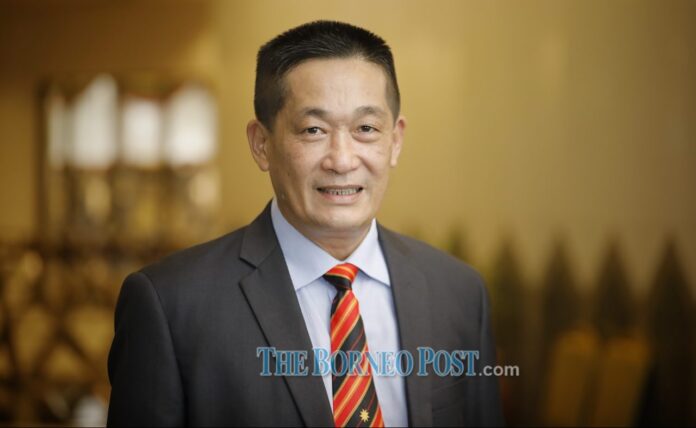See Chee How
KUCHING (Aug 2): The same stipulations that allow for Parliament sitting should have been included in the Emergency (Essential Powers) (Sarawak) Ordinance 2021 [EEPSO 2021] to allow for the sitting of the State Legislative Assembly (DUN) for the 2022 State Budget, said Batu Lintang assemblyman See Chee How.
In a statement issued here yesterday, See said he was hopeful that the Sarawak state government would bring up such matter to Putrajaya to ensure that parliamentary democracy, the dignity of DUN Sarawak and the state’s best interests and autonomous rights would be best safeguarded and protected.
“Regrettably and injudiciously, Section 4 of EEPSO 2021 provides that for the duration of the Emergency, the provisions relating to the sitting of the DUN in the Constitution of the State of Sarawak shall have no effect.
“In promulgating that the provision in Article 21 Clause (1) of the Sarawak Constitution that empowers the Governor (Yang Di-Pertua Negeri) to summon the DUN to sit (meet) to have no effect, it is however in contravention with Section 9 (1) of the Eighth Schedule of the Federal Constitution which provides that the Ruler shall summon the Legislative Assembly to sit and shall not allow six months to elapse as from the last sitting,” he said in the statement.
See pointed out that this was inconsistent with the provisions of the Emergency (Essential Powers) Ordinance 2021, promulgated after the National Emergency was proclaimed.
He pointed out that the Ordinance for the Nationwide Emergency, particularly Section 15 (1), stipulated that a State Legislative Assembly shall be summoned, prorogued and dissolved on a date as the Yang di-Pertuan Agong would think appropriate after consultation with the respective Ruler, or the Yang di-Pertua Negeri.
“It was under the said provision, with the concern of the Yang di-Pertuan Agong as regards the national efforts to combat the Covid-19 pandemic and the National Recovery Plan (NRP) that the Parliament sitting last week was summoned.
“The same stipulations in Section (1) of EEPO should have been provided in Section 4 of the EEPSO 2021, as expedient, beneficial to all Sarawakians and to show consistency of our laws, if the Yang di-Pertuan Agong after consultation with the Yang di-Pertua Negeri, may think it appropriate to summon the sitting of the DUN Sarawak, explicitly and particularly, for the tabling, deliberation and passing of the State Budget for 2022, since the present Emergency is proclaimed for the period and may in effect subsist until Feb 2, 2022.
“This is to safeguard and protect the parliamentary democracy and dignity of our DUN Sarawak,” said See, who is also Parti Sarawak Bersatu (PSB) presidential council member.
He was commenting on calls for the DUN Sarawak to convene during the extended Emergency.
The Yang Di-Pertuan Agong had issued the Proclamation of Emergency (Sarawak) being issued pursuant to Clause (1) of Article 150 of the Federal Constitution, whereby the EEPSO 2021 was promulgated under Article 150 (2B).
Amongst those matters made clear by the EEPSO 2021, Section 2 (2) provides that the operation of the Proclamation of Emergency (Sarawak) may be terminated earlier by the Yang Di-Pertuan Agong after consultation with the Yang Di-Pertua Negeri Sarawak.
It has also made clear in Section 3 that the DUN Sarawak shall be dissolved on the date when the Proclamation of Emergency (Sarawak) is revoked or annulled.
On a related matter, See regarded Section 10 of the EEPSO 2021 as ‘most remarkable and significant’ in drawing emphasis to the needs for ‘treatment, immunisation, isolation, observation or surveillance’ to contain and combat Covid-19.
He noted that it, however, should be a joint and corroborated effort between Sarawak and the federal health and medical departments and agencies.
He pointed out the EEPSO 2021, henceforth, should not just specify and rely solely on the provisions of the Prevention and Control of Infectious Disease Act 1988, but to also give equal emphasis to (Sarawak) Protection of Public Health Ordinance 1962/1999.
“To avoid replication of roles, rifts and confusion, the directions for treatment, immunisation, isolation, observation or surveillance should come from a committee or body comprising Sarawak and federal health and medical officers serving in Sarawak to ensure timeous and appropriate decisions being made to address the local Sarawakian issues and concerns.
“After all, the subject matter of public health, sanitation and the prevention of diseases is expressed provided under the ‘Concurrent List’ in the Ninth Schedule of the Federal Constitution, applicable to Sarawak and Sabah, in the distribution of legislative powers,” said See.


